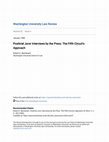Papers by Robert Bacharach

Washington University Law Review, 1985
In all criminal prosecutions, the accused shall enjoy the right to a speedy and public trial,by a... more In all criminal prosecutions, the accused shall enjoy the right to a speedy and public trial,by an impartial jury.. . and to be informed of the nature and cause of the accusations; to be confronted with the witnesses against him; to have compulsory process for obtaining witnesses in his favor, and to have assistance of counsel for his defense. U.S. CoNsT. amend VI. 4. Federal courts have consistently held that the first amendment does not guarantee the press access to information beyond that available to the public. Zemel v. Rusk, 381 U.S. 1, 16-17 (1965) (upheld government's refusal to validate passports of tourists desiring to visit Cuba). The Fifth Circuit, in In re Express-News Corp., 695 F.2d 807 (5th Cir. 1982), approved of the line of cases that gives the press a right of access equal to that of the general public. Id. at 809-10. Tension between the first and sixth amendments has arisen in a variety of contexts. For example, a number of federal districts have local court rules which prohibit the taking of photographs in, or in the immediate vicinity of, the courtroom.
Okla. L. Rev., 1987
causes to be subjected, any citizens of the United States or other person within the jurisdiction... more causes to be subjected, any citizens of the United States or other person within the jurisdiction thereof to the deprivation of any rights, privileges, or immunities secured by the Constitution and laws, shall be liable to the party injured in an action at law, suit in equity, or other proper proceeding for redress. For the purposes of this section, any act of Congress applicable exclusively to the District of Columbia shall be considered to be a statute of the District of Columbia. 2. The proposal provides as follows: "No action, suit, or proceeding under this section shall be maintained in any court of the United States until the plaintiff shall have exhausted any presently available state administrative procedures that would afford a plain, speedy, and adequate remedy for the alleged wrong." Lay, Exhaustion of Grievance Procedures for State
See also infra notes 58-69 and accompanying text. 3. A "tipper" is a person who discloses materia... more See also infra notes 58-69 and accompanying text. 3. A "tipper" is a person who discloses material inside information. A "tippee" is the recipient of such information.
Washington University Law Review, 1984
See also infra notes 58-69 and accompanying text. 3. A "tipper" is a person who discloses materia... more See also infra notes 58-69 and accompanying text. 3. A "tipper" is a person who discloses material inside information. A "tippee" is the recipient of such information.
Indiana law review, 2009
discussing "desirability that the law furnish a clear guide for the conduct of individuals. .. an... more discussing "desirability that the law furnish a clear guide for the conduct of individuals. .. and the necessity of maintaining public faith in the judiciary as a source of impersonal and reasoned judgments"); see also La. ex rel. Francis v. Resweber, 329 U.S. 459, 470 (1947) (Frankfurter, J., concurring) (stating that the problem before the Court "involve[d] the application of standards of fairness and justice broadly conceived. .. . [N]ot the application of merely personal standards but the impersonal standards of society which alone judges as the Organs of Law are empowered to enforce" (emphasis added)). 2. See infra Part I.

In all criminal prosecutions, the accused shall enjoy the right to a speedy and public trial,by a... more In all criminal prosecutions, the accused shall enjoy the right to a speedy and public trial,by an impartial jury.. . and to be informed of the nature and cause of the accusations; to be confronted with the witnesses against him; to have compulsory process for obtaining witnesses in his favor, and to have assistance of counsel for his defense. U.S. CoNsT. amend VI. 4. Federal courts have consistently held that the first amendment does not guarantee the press access to information beyond that available to the public. Zemel v. Rusk, 381 U.S. 1, 16-17 (1965) (upheld government's refusal to validate passports of tourists desiring to visit Cuba). The Fifth Circuit, in In re Express-News Corp., 695 F.2d 807 (5th Cir. 1982), approved of the line of cases that gives the press a right of access equal to that of the general public. Id. at 809-10. Tension between the first and sixth amendments has arisen in a variety of contexts. For example, a number of federal districts have local court rules which prohibit the taking of photographs in, or in the immediate vicinity of, the courtroom.
Wash. ULQ, 1984
See also infra notes 58-69 and accompanying text. 3. A "tipper" is a person who discloses materia... more See also infra notes 58-69 and accompanying text. 3. A "tipper" is a person who discloses material inside information. A "tippee" is the recipient of such information.
Ind. L. Rev., 2009
discussing "desirability that the law furnish a clear guide for the conduct of individuals. .. an... more discussing "desirability that the law furnish a clear guide for the conduct of individuals. .. and the necessity of maintaining public faith in the judiciary as a source of impersonal and reasoned judgments"); see also La. ex rel. Francis v. Resweber, 329 U.S. 459, 470 (1947) (Frankfurter, J., concurring) (stating that the problem before the Court "involve[d] the application of standards of fairness and justice broadly conceived. .. . [N]ot the application of merely personal standards but the impersonal standards of society which alone judges as the Organs of Law are empowered to enforce" (emphasis added)). 2. See infra Part I.

Uploads
Papers by Robert Bacharach